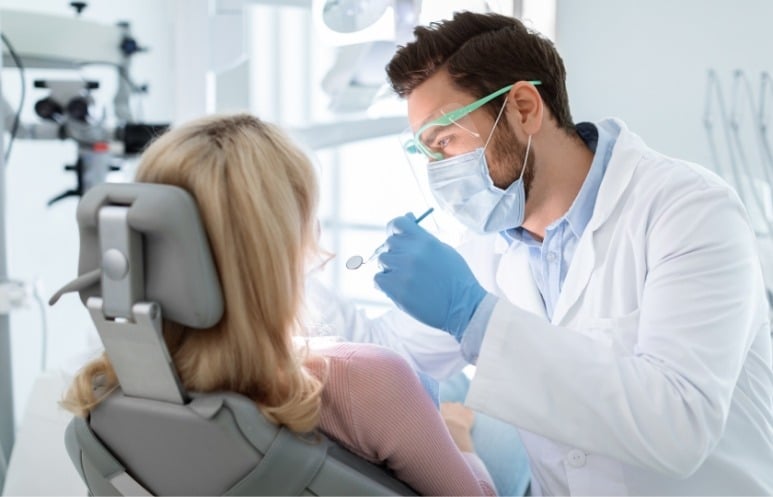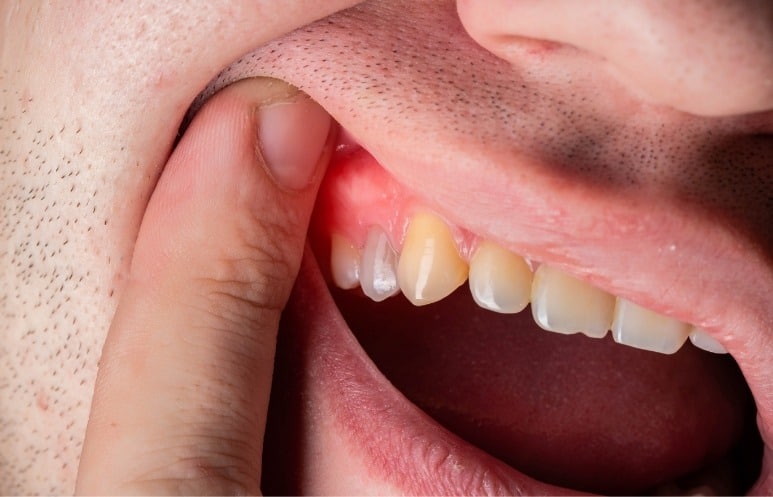Dental emergencies

Sometimes, unexpected situations arise that require rapid evaluation. At the Centre dentaire Taschereau in Brossard, we offer emergency consultations during business hours.


Dental emergencies: identify them to react appropriately
There are many urgent or worrying situations: toothache, minor injury, tooth breakage or loss, etc. In most cases, they require a quick response. In most cases, they call for professional intervention to find the cause of the problem and/or propose the appropriate solution. From the moment the incident occurs until your appointment, there are a number of steps you can take to control the pain and potential consequences.
By taking the appropriate steps for the type and severity of the emergency, you can help your dentist in his or her assessment and treatment!
By taking the appropriate steps for the type and severity of the emergency, you can help your dentist in his or her assessment and treatment!
Dental pain
This is undoubtedly the most frequent emergency, and one of the most important to take seriously. And that's because there are many potential causes of toothache, which can have serious consequences if not treated properly.
Possible causes
Deep tooth decay: although initially asymptomatic, tooth decay becomes painful as the infection deepens and bacteria penetrate sensitive parts of the tooth;
Gum disease: gingivitis, but especially periodontitis, sometimes leads to functional pain. These usually occur during oral hygiene routines or when chewing food;
Broken or detached restorations (fillings, crowns or fixed bridges);
An ill-fitting prosthesis: this can cause irritating friction or exert undue pressure on the supporting tissues;
Post-surgical complications: it's normal to experience some discomfort after a filling or root canal, and moderate pain after dental surgery, but this should be short-lived. Severe and persistent pain may therefore indicate the presence of residual infection or other problems;
Gum disease: gingivitis, but especially periodontitis, sometimes leads to functional pain. These usually occur during oral hygiene routines or when chewing food;
Broken or detached restorations (fillings, crowns or fixed bridges);
An ill-fitting prosthesis: this can cause irritating friction or exert undue pressure on the supporting tissues;
Post-surgical complications: it's normal to experience some discomfort after a filling or root canal, and moderate pain after dental surgery, but this should be short-lived. Severe and persistent pain may therefore indicate the presence of residual infection or other problems;
Pain intensity and required reaction
Mild to moderate intensity: more moderate pain, or pain that goes away on its own, should also be taken seriously. They are also a sign of a deeper problem that won't go away overnight. For this reason, the pain is likely to return with greater intensity if the cause is left untreated. So it's important to tell your dentist about this kind of pain at the time of your preventive check-up. If it's not due for a long time, it's best to bring it forward;
Sharp intensity: toothaches that are so powerful that they wake you up at night and interfere with your daily activities call for prompt intervention. That way, we can find the source of the pain and propose a solution that will put an end to it. While you're waiting for your appointment, relieve the sensations with over-the-counter painkillers (such as Tylenol or Advil).
In all cases: whatever the intensity of the pain, your dentist will undoubtedly ask you questions about its characteristics: intensity, source, frequency of occurrence, triggers, etc. This information will help him or her to guide you in the right direction. This information will help guide your dentist in his or her search for the cause of the pain and ways to treat it!
Sharp intensity: toothaches that are so powerful that they wake you up at night and interfere with your daily activities call for prompt intervention. That way, we can find the source of the pain and propose a solution that will put an end to it. While you're waiting for your appointment, relieve the sensations with over-the-counter painkillers (such as Tylenol or Advil).
In all cases: whatever the intensity of the pain, your dentist will undoubtedly ask you questions about its characteristics: intensity, source, frequency of occurrence, triggers, etc. This information will help him or her to guide you in the right direction. This information will help guide your dentist in his or her search for the cause of the pain and ways to treat it!
Dental abscess
This is a deep infection that lodges under the gums, close to the roots of a tooth. Although one of the possible causes of toothache, abscesses are usually accompanied by other symptoms: toothache, swelling and pus eruptions. It also leads to chronic bad breath, sometimes accompanied by fever and headaches. It's important to mention all symptoms when requesting an appointment, as this situation calls for rapid treatment. To relieve the pain before the consultation, use over-the-counter painkillers (Tylenol or Advil) and warm water compresses. Keep an eye out for signs of infection, and go straight to the emergency room if the swelling moves elsewhere in the face, especially near the eyes.

Various traumas
A fall, a blow to the face, repeated shocks, inadvertently biting into hard food: these are all situations that can lead to oral traumas and injuries of varying nature and severity.
Minor injuries
Cuts to soft tissues (tongue, lips, inner cheeks): these are often caused by blows or self-bites. Bleeding from such wounds normally subsides after a while. However, it can be reduced by applying pressure with a clean cloth. A cold compress can also be applied to reduce swelling, if necessary.
Mild traumar: If you've received a blow or shock and the pain is mild, gradually diminishing and the affected tooth remains stable, there's no need to intervene. You should, however, mention the incident to your dentist at your next check-up. If the tooth changes color in the meantime, you'll need to consult your dentist sooner. This phenomenon generally indicates the death of the central nerve, a situation that can lead to other consequences (dental abscess, pain, weakening of the tooth, etc.).
Mild traumar: If you've received a blow or shock and the pain is mild, gradually diminishing and the affected tooth remains stable, there's no need to intervene. You should, however, mention the incident to your dentist at your next check-up. If the tooth changes color in the meantime, you'll need to consult your dentist sooner. This phenomenon generally indicates the death of the central nerve, a situation that can lead to other consequences (dental abscess, pain, weakening of the tooth, etc.).

Severe trauma, fractures and tooth loss
Loose tooth : If the tooth or teeth affected by trauma move or seem unstable, ask your Brossard dentist for an appointment immediately. The mobility could be due to a bone or root fracture. The pain that often accompanies such injuries can be controlled with over-the-counter analgesics (Tylenol or Advil);
Expelled tooth: call us for an appointment as soon as possible. In the meantime, retrieve the tooth, always handling it by the crown and avoiding touching the roots. Rinse it gently with water, then try to put it back into its socket to preserve it while you wait for your consultation. If this is too painful, place it in a small container of saliva, water or milk instead;
Mild fracturee: if only a corner of the tooth has become detached, and there is no marked pain or discomfort, there is no need to seek immediate medical attention. However, this situation can lead to sensitivity to hot or cold. The broken tooth is also more friable and abrasive, potentially causing undue wear to neighbouring teeth. It is therefore advisable to make an appointment with your dentist, who will probably file the tooth, as this is usually sufficient in these cases;
Moderate to severe fracture: if the fracture is more pronounced, causing marked sensitivity or even pain, it's important to consult your dentist as soon as possible. The fractured tooth is then vulnerable to bacterial infiltration. It's also vital to see a dentist as soon as possible if the pain is very severe, or if there's blood or a red spot at the site of the break. This probably means that the nerve has been affected.
Expelled tooth: call us for an appointment as soon as possible. In the meantime, retrieve the tooth, always handling it by the crown and avoiding touching the roots. Rinse it gently with water, then try to put it back into its socket to preserve it while you wait for your consultation. If this is too painful, place it in a small container of saliva, water or milk instead;
Mild fracturee: if only a corner of the tooth has become detached, and there is no marked pain or discomfort, there is no need to seek immediate medical attention. However, this situation can lead to sensitivity to hot or cold. The broken tooth is also more friable and abrasive, potentially causing undue wear to neighbouring teeth. It is therefore advisable to make an appointment with your dentist, who will probably file the tooth, as this is usually sufficient in these cases;
Moderate to severe fracture: if the fracture is more pronounced, causing marked sensitivity or even pain, it's important to consult your dentist as soon as possible. The fractured tooth is then vulnerable to bacterial infiltration. It's also vital to see a dentist as soon as possible if the pain is very severe, or if there's blood or a red spot at the site of the break. This probably means that the nerve has been affected.
Book an appointment
Call us at (450) 912-1688 to schedule your next visit. You can also fill out our online appointment request form. We'll get back to you as soon as possible to offer you a suitable time slot, whether you already have a file with us or are looking for a new clinic!